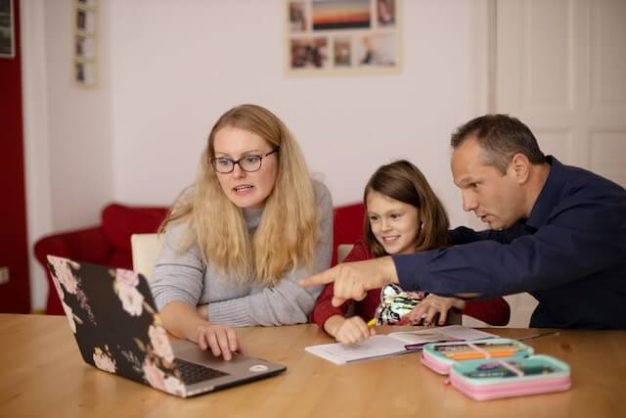Parenting Plans: A Practical Guide for Separated Parents

Contact
Table of Contents
A well-written parenting plan can help separated parents reduce conflict while putting children’s needs first.
When parents divorce or separate, their biggest concern is ensuring their children continue to receive love, support, and stability. Establishing clear arrangements for your child’s care can make an enormous difference to their well-being during this emotionally challenging time.
Imagine a child torn between two households, unsure of where they’ll be next weekend or who’s picking them up from school. A parenting plan provides clarity, structure, and reassurance, for both children and parents.
This guide explains what a parenting plan is, what it should include, and how you can create one that works for your family.
What is a parenting plan?
A parenting plan (also known as a parenting agreement or shared parenting plan) is a written agreement between parents that sets out how they will care for their child following separation or divorce.
It typically covers:
- Living arrangements
- Visitation and contact
- Schooling and education
- Health care decisions
- Financial responsibilities
- Holidays and special occasions
- Communication between parents
Parenting plans are voluntary and not legally binding, but they can help reduce misunderstandings and conflict. They also keep the focus on the child’s needs, rather than the parents’ disagreements.
Do I need a parenting plan?
A parenting plan can be highly beneficial for families that share parenting responsibilities. It provides a clear and structured approach to co-parenting, outlining how responsibilities will be shared. This helps to reduce misunderstandings and conflicts, ensuring that both parents are on the same page regarding their roles and expectations.
Non-court dispute resolution (NCDR) methods, such as mediation, collaborative law, and arbitration, play a crucial role in agreeing on a parenting plan. These methods offer parents an alternative to going to court, providing a more amicable and constructive environment to discuss and agree on the arrangements for their children’s care.
Benefits of a parenting plan
- Encourages co-operation and communication
- Provides structure and routine for children
- Reduces the risk of disputes and confusion
- Helps avoid going to court
While informal, parenting plans can later be formalised into a legally binding agreement or court order if needed.
Shared parenting and the Re Z case
A landmark case, Re Z (2006), highlighted how shared parenting can work even when parents have serious disagreements. Despite a history of conflict, the parents in this case agreed to a 50/50 shared care arrangement without going to court.
The Re Z parenting plan was endorsed by the court as a model, showing that shared care can succeed with clear, structured agreements. It remains a relevant example for parents today, demonstrating that shared care is possible, even in less-than-amicable situations, with the right legal support and a focus on the child’s best interests.
Key Components of a Parenting Plan
A comprehensive plan should cover the following:
1. Living Arrangements
- Where your child will live
- How time is divided (e.g., 50/50 or 70/30)
- Term-time vs. holiday arrangements
2. Contact and Communication
- When the child sees the other parent
- Phone/video call expectations
- Keeping emotional bonds strong
3. Schooling and Education
- School choices and attendance
- Homework routines
- Parent-teacher communication
4. Health Care
- Who manages appointments
- Sharing medical information
- Emergency contact procedures
5. Religion and Culture
- Agreement on religious upbringing
- Involvement in cultural events
6. Holidays and Special Occasions
- Birthday and holiday scheduling
- Alternating arrangements
7. Communication Between Parents
- How and when to communicate
- Protocols for major decisions
8. Financial Contributions
- Day-to-day costs (e.g., uniforms, lunches)
- Child maintenance (handled separately)
9. Changes and Dispute Resolution
- Annual reviews of the plan
- Mediation or legal advice for disputes
Using CAFCASS Templates
CAFCASS (Children and Family Court Advisory and Support Service) is an independent organisation that supports children in family court cases in England. It offers helpful tools and templates for creating parenting plans. These include:
- An interactive online tool
- Downloadable Microsoft Word templates
When mediation helps
If you struggle to agree on parenting arrangements, mediation can help. A trained mediator supports both parents to focus on the child’s needs and work towards a mutually acceptable plan.
Programs like Planning Together for Children offer workshops and resources to support collaborative parenting.
If there are concerns about safety (e.g., abuse or substance misuse), legal advice is essential.
Parenting Plan Template – Re Z Schedule
First Schedule (Shared parenting commitments)
- Equal parental responsibility
- Shared care commitment
- Equal time during holidays
- School attendance and passport agreements
Second Schedule (Children’s rights)
- Ongoing relationship with both parents
- Age-appropriate explanations
- No manipulation or conflict exposure
Speak to us about a parenting plan
Every family is different. If you’re creating a parenting plan or struggling to agree on arrangements, professional legal advice can help you protect your child’s best interests. At Osbornes Law, our family solicitors are experts in co-parenting arrangements and dispute resolution.
To speak with one of our family solicitors, contact us by:
- Filling in our online enquiry form; or
- Calling us on 020 7485 8811
Further reading
- Read our blog post: What is Parallel Parenting?
- Read our blog post: What is Co-Parenting And Is It Right for Us?
About the author
Lisa Pepper is a Partner at Osbornes Solicitors LLP and is recommended in Chambers and Partners and the Legal 500. Lisa is ranked as a Distinguished Individual in Spears Family Law. She is an Accredited Mediator.
Share this article
“The family law team at Osbornes is one of the strongest in London; across all areas of work from international cases, financial and children work, Osbornes is a market leader.”
“Osbornes Law has an excellent children law department. It is client focused and committed to achieving the best outcome for its clients and it keeps the focus on the bigger picture.”
FAQ
Are Parenting Plans legally binding?
Parenting plans (parenting agreements) are voluntary arrangements. They work best when they are flexible and updated regularly to take into account the child’s changing needs.
They are not legally binding but can be used as evidence of a prior agreed arrangement, should you end up in court on children matters, further down the line if your co-parenting relationship breaks down. Discussing a parenting plan with your ex also flushes out whether you are going to be able to settle child arrangements between yourselves or if you need to consider NCDR (Mediation, Arbitration or Early Neutral Evaluation – ‘ENE’) to help you resolve matters.
If you are considering making a parenting plan legally binding, it is a good idea to speak to a solicitor first. They can discuss the pros and cons and help you draft the paperwork.
Contact us today
Call us 020 7485 8811
Email us Send us an email and we’ll get back to you
Lisa Pepper is really sensible and practical, very down to earth and has excellent knowledge of the law.
Lisa Pepper is an effective, highly skilled family lawyer but also an absolutely brilliant mediator. She instils confidence in everyone around her.
Lisa Pepper is a sensitive and pragmatic mediator.
Lisa has a real air of authority about her. She can put people at ease immediately.
Lisa Pepper is a very engaging solicitor; clients love her. She is commercial, pragmatic, a tough negotiator, and not afraid of judges and going to court.
Lisa Pepper is a standout mediator - smart, sensitive and able to narrow the issues with ease.
Lisa is good at cutting to the chase and identifying issues. She gets people talking and brings people together.
Lisa is excellent - she's efficient, has a very good rapport with her clients and has an enormously outgoing energy. She is very effective in managing clients' cases.
Lisa Pepper – one of the best mediators around, whose very reasonable rates don’t reflect her excellent client base
Lisa Pepper is a great go-to solicitor for anyone wanting quick and appropriate advice
Lisa Pepper at Osbornes is hugely approachable. She is calm, clients always praise her. Underneath her calm and approachable exterior is an excellent legal brain
I am confident that Lisa will do her utmost to try and settle matters so that both parties walk away feeling satisfied that they have managed to reach a fair outcome with the assistance of a professional mediator.
Lisa Pepper is robust, competent and knowledgeable and is always keen to try and help parties settle without intervention of the court.
Lisa Pepper is an outstanding mediator. She gets results in very difficult cases. She works extremely hard to get a good outcome for clients who mediate with her
Lisa Pepper- she has a great combination of skills. She is empathetic, approachable and calm, and has good legal judgment. She inspires confidence and trust
"Lisa Pepper is good at making herself available to clients and has a real focus on finding pragmatic solutions."
"Lisa Pepper is a complete all rounder. Her mediation skills are second to none. She is kind and compassionate and knows the law inside out!."
"Lisa Pepper is ‘compassionate, supportive and committed to hear clients, with a very warm manner."
"Lisa Pepper is fantastic. She goes the extra mile for her clients and is a superb mediator."
"Osbornes has a hugely experienced mediation team with Andrew Watson, Bridget Thompson and Lisa Pepper who are able to offer financial and children mediation for a range of cases including those that are highly complex involving challenging clients."
"Lisa Pepper is fantastic with people and generates calm in her meetings to help clients give of their best."
I can’t think of anyone who would handle a mediation better than Lisa.
Lisa Pepper is extremely hard-working and adored by her clients. She is a very empathetic and approachable lawyer.
"Lisa Pepper was recommended to me as non-nonsense and able to help me with a difficult and confrontational divorce. She more than lived up to that – she was practical, collected and always available with a clear opinion and suggestions of how to move forwards. She also was open and helpful about costs and how to mitigate them"
"Lisa Pepper is an outstanding mediator. She is very skilled and has an empathetic and professional approach which is comforting for clients. She never imposes her own view but is even handed and provides helpful guidance to clients so that they can make empowered decisions"
"Lisa Pepper has built up a very impressive mediation practice. She is very engaging and easy to relate to. She embodies mediation in the sense that she approaches her case in a very non-judgmental fashion and can quickly gain the confidence of those with whom she is mediating"
"Lisa Pepper is a brilliant mediator who produces results. She is effective at resolving matters without the need for the parties to engage in expensive and protracted litigation"
"Lisa Pepper is a fantastic mediator. She is fair, robust when she needs to be, and finds a way of facilitating agreements in the hardest of cases. Her guidance is spot on. She has an approachable and constructive mediation style"
"She has impressed me as someone who fights my corner but also understands the importance of resolving issues without unnecessary escalation. She is calm and reassuring."
"Her mediation practice is exceptional; she is also a great solicitor and has a breadth of skill which is really useful."
Lisa Pepper is extremely approachable and this shines through in the outcomes she achieves from mediation. She makes clients feel at ease, which enables them to feel empowered to resolve matters amicably and find a creative outcome which many mediators may have overlooked.
Lisa Pepper is building a very strong mediation practice at very competitive rates and is able to build a rapport quickly with almost anyone.
Lisa Pepper loves her work and has a very sensible head on her. That means her practice is thriving and rightly so.
Lisa Pepper is very thorough in her preparation and has super personal skills to put parties in mediation at ease
Lisa Pepper – good litigator, very friendly and approachable but tough, “straight bat” with the opposition. Can steer a client deftly to settle when he should.
Lisa Pepper gave me clear, level-headed and sensible advice during her handling of my divorce, and she demonstrated excellent understanding of the relevant law. She was on my side but fair and pragmatic, and her advice was always given with an eye to what was both equitable and achievable, and in line with the collaborative approach I’d wanted.
Lisa Pepper is particularly recognised for her role as a mediator in complex cross-border disputes. Her practice also includes handling prenuptial agreements and issues arising from the dissolution of civil partnerships.
"Lisa Pepper is "caring and considerate of the issues behind a matter, and will speak directly if she feels clients need that advice."
"The very personable and client-focused Lisa Pepper."
"Lisa Pepper somehow manages to get parties to settle on matters where there isn’t much hope to start out with."
"Lisa can handle the large and complicated cases but takes equal care with the smaller cases. She is a highly skilled mediator who is a consummate professional."
Lisa Pepper is a skilled collaborative lawyer. Her instinct is always to resolve matters without compromising her clients’ interests.
Lisa Pepper is always looking for a solution and has a very sympathetic approach to clients. She is highly regarded for her collaborative law practice.
Lisa Pepper deals with separation proceedings and leave to remove cases. Sources describe her as "a great person to work with: constructive, helpful and always infectiously happy.
Insights from our London Divorce LawyersVIEW ALL
- 27.10.2025
Parental Involvement Presumption Set to End
Government to scrap presumption of parental involvement in child arrangements cases At Osbornes Law, the family team represents parents and...
Read more - 17.12.2024
Domestic Abuse Allegations: Unsupervised Contact Controversy
Unsupervised Contact Was Premature When Domestic Abuse Alleged Unsupervised contact is not appropriate where a child is considered to be...
Read more - 16.12.2024
Vulnerable Clients: Female Psychologist Appointed
Court Allows Female Expert for Abuse Victim in Family Case Many of our family clients are highly vulnerable, and sensitivity...
Read more - 27.9.2024
Navigating Divorce, Child Arrangements, and the Jewish Festivals:...
A Jewish divorce presents unique challenges, especially regarding child arrangements and upcoming festivals. Balancing differing levels of religious observance can...
Read more - 5.8.2024
Why Did Lauryn Goodman Take Kyle Walker to...
Introduction to the case After a judge took the unusual step of making his judgement public, we’re starting to...
Read more - 11.7.2024
Unmarried With Children and Splitting Up
Unmarried with Children? What are your Financial Rights? Know Your Financial Rights Under Schedule One Children Act 1989 A claim under...
Read more - 17.6.2024
What is Early Neutral Evaluation?
Early Neutral Evaluation (ENE) is a form of Non-Court Dispute Resolution where the separated couple invites a neutral third party...
Read more - 4.6.2024
What is Parallel Parenting? Examples, rules, and why...
Parallel parenting is a practical solution for families experiencing ongoing conflict who find traditional co-parenting unworkable. In this article, we...
Read more - 3.6.2024
Co-Parenting with a Narcissist
Can you co-parent with a narcissist? Co-parenting with a narcissist ex can be daunting, but it’s possible with the...
Read more - 29.5.2024
Co-Parenting Agreements
Is co-parenting right for us? There is no single approach to parenting your children after a divorce or separation. How...
Read more - 15.5.2024
Can a Mother Stop a Father from Seeing...
Can my ex stop me from seeing my child? There is a common misconception that mothers have more rights than...
Read more - 14.12.2023
Parental alienation: A legal overview
Sometimes, a child may turn against one of their parents due to the other parent’s manipulation or influence. This...
Read more - 16.8.2023
Child Maintenance for High Earners
How much should be paid? When separating or divorcing parents cannot agree the amount of child maintenance to be paid, (...
Read more - 25.7.2023
Parental Conduct and Child Arrangements
The Role of Family Dynamics in Child Arrangement Cases In proceedings involving children, the parents should consider the impact their...
Read more - 22.3.2023
What is Parental Responsibility?
Understanding Parental Responsibility Parental responsibility is the legal term used to describe parents’ duties and responsibilities for their children. These...
Read more - 18.1.2022
6 cases that shape a private children dispute
Family disputes involving children can be particularly emotive, which is why our expert children lawyers work tirelessly to understand how...
Read more - 10.8.2021
Child Maintenance: When is capital, income?
Reading a recent case from the Child Maintenance Tribunal, I considered it worth flagging up that the Child Maintenance Rules...
Read more - 11.3.2021
Financial responsibilities of father on divorce
What are the financial responsibilities of a father for a child? The period drama Bridgerton, the runaway success of the...
Read more - 13.8.2019
Child Arrangements at Christmas
The Christmas period can be a hectic and stressful time for all parents, but for separated parents, it can be...
Read more - 2.1.2018
How To Tell Children About Divorce
How to tell kids about divorce The rise in divorce globally has turned the attention of academics and researchers towards...
Read more - 19.6.2012
Children disagreements during Easter holidays
The Easter holidays can be a flashpoint for disagreements. When couples separate, it can be very difficult to reach an...
Read more





























